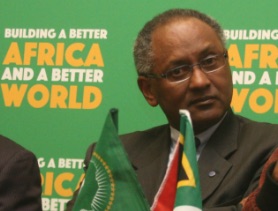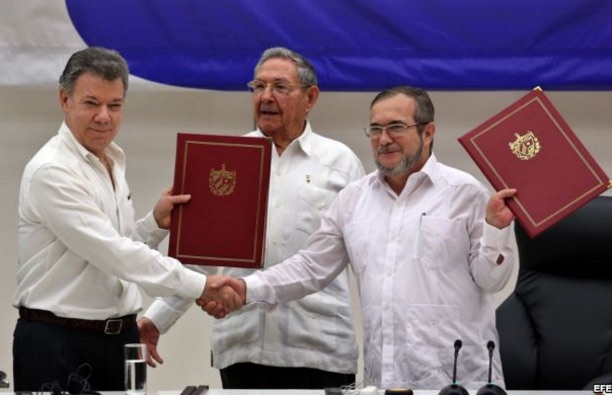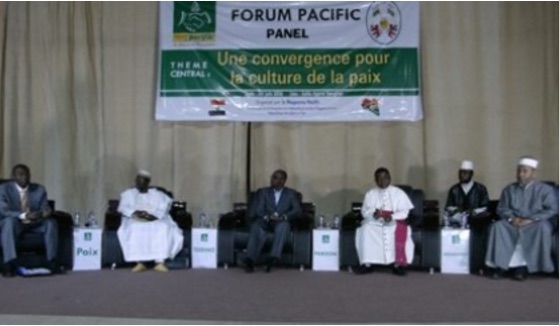The government of Colombia and the FARC guerilla movement have agreed on a ceasefire and plan for demobilization. The bilateral ceasefire and surrender of the weapons will begin with the signing of the final peace agreement (expected in July) and this last point will have a term development of 180 days. A monitoring group composed of delegates from the UN will be created by the FARC and the Colombian government to verify the delivery of the guns. Also announced was the creation of areas and camps for demobilized guerrillas and commitment by the authorities to combat paramilitary groups, by means of a special unit of the Colombian police.
As stated by the UN Secretary-General Ban Ki-Moon, “Today the Colombian peace process validates the perseverance of all those around the world who work to end violent conflict not through the destruction of the adversary, but through the patient search for compromise.”
According to analysts, “What remains between now and a final, conflict-ending peace accord are details. Some of these will be thorny, and may require weeks or even a few months to unravel. But the hardest parts of the FARC peace process are now in the past.”
Already, the first United Nations observers have arrived to help with the demobilization process.
The Colombia people are celebrating but still fearful, as described by Amada Benavides, Fundación Escuelas de Paz: “Today at 12:39 when President Santos and the FARC leader signed the agreement, all of us, our partners and myself, only can to cry. After 60 years of war, we not really believe what it happened in that moment. Many of us never think in could seeing this moment. At night, we had a workshop about Women, Diversity and Peace, and the feeling turned between hope, fear and anxiety. Hope for the possibilities the agreement has. Fear for many populations is not yet convinced in the benefits of peace; and anxiety for all the work we have in this moment. Peacebuilding moment starts just now. Today we need more support than ever.”
Last month the government and FARC signed an agreement to ensure that their peace accords will be binding on future governments of Colombia. This is important because there is already an opposition movement in Colombia headed by an ex-president who say they will try to overturn the accords.
As we have often said, peace is too important to be left alone in the hands of the national government. What is important is that it is being taken up by people at all levels in Colombia.
A key role is played by teachers and the movement for peace education, as in a recent meeting in Bogota: “Participants . . . included teachers, academics and trainers who shared their experiences and daily reflections. Together, they reaffirmed that there will be no peace unless there is peace education to transform the culture, and this requires a renewal of pedagogy.”
Artists and cultural actors have an important role to play, as described by the Director of a theatre in Medellin: “We have to to disarm our words because they are still loaded with violence. That will take a lot of pedagogy and here culture can help a lot. We need to heal, to seek the truth, to have some kind of repair,”
Colombian women, under the banner of “One Million Women for Peace,” are demanding a greater role in the peace process, saying that “Peace in Colombia Is Impossible Without Us”. The newly-formed bloc aims to create a community movement to provide popular backing for the peace process. The movement brings together farmers, artists, journalists, youth and political representatives of indigenous and Afro-Colombian communities.
It is especially important to establish peace at the level of local government. For example, the city of Cali, Colombia, has established a “Plan for Peace and Peaceful Coexistence”. It is a guide prepared by the Peace Advisory Council, in consultation with different social actors such as the High Council for Peace and Human Rights of the Government of Valle, the Archdiocese, universities along with staff of the mayor’s office in Cali and agencies such as the Post-Conflict Advisory Council.
As stated by Raul Castro, who mediated the accords, “The achievement of peace in Colombia represents a hope for millions of people on the planet, whose main concern continues to be human survival in a world shaken by violence and wars. Peace is not a utopia; it is a legitimate right of every human being and of all peoples. It is a fundamental condition for the enjoyment of all human rights, particularly the supreme right to life.”
|
FREE FLOW OF INFORMATION |
WOMEN’S EQUALITY |
EDUCATION FOR PEACE Ivory Coast: UNESCO announces the creation of a school for the Culture of Peace in Yamoussoukro |
HUMAN RIGHTS ‘March of Silence’ in Uruguay sends message of remembrance to South America |
|
TOLERANCE AND SOLIDARITY |
SUSTAINABLE DEVELOPMENT |
DISARMAMENT AND SECURITY |
DEMOCRATIC PARTICIPATION |





